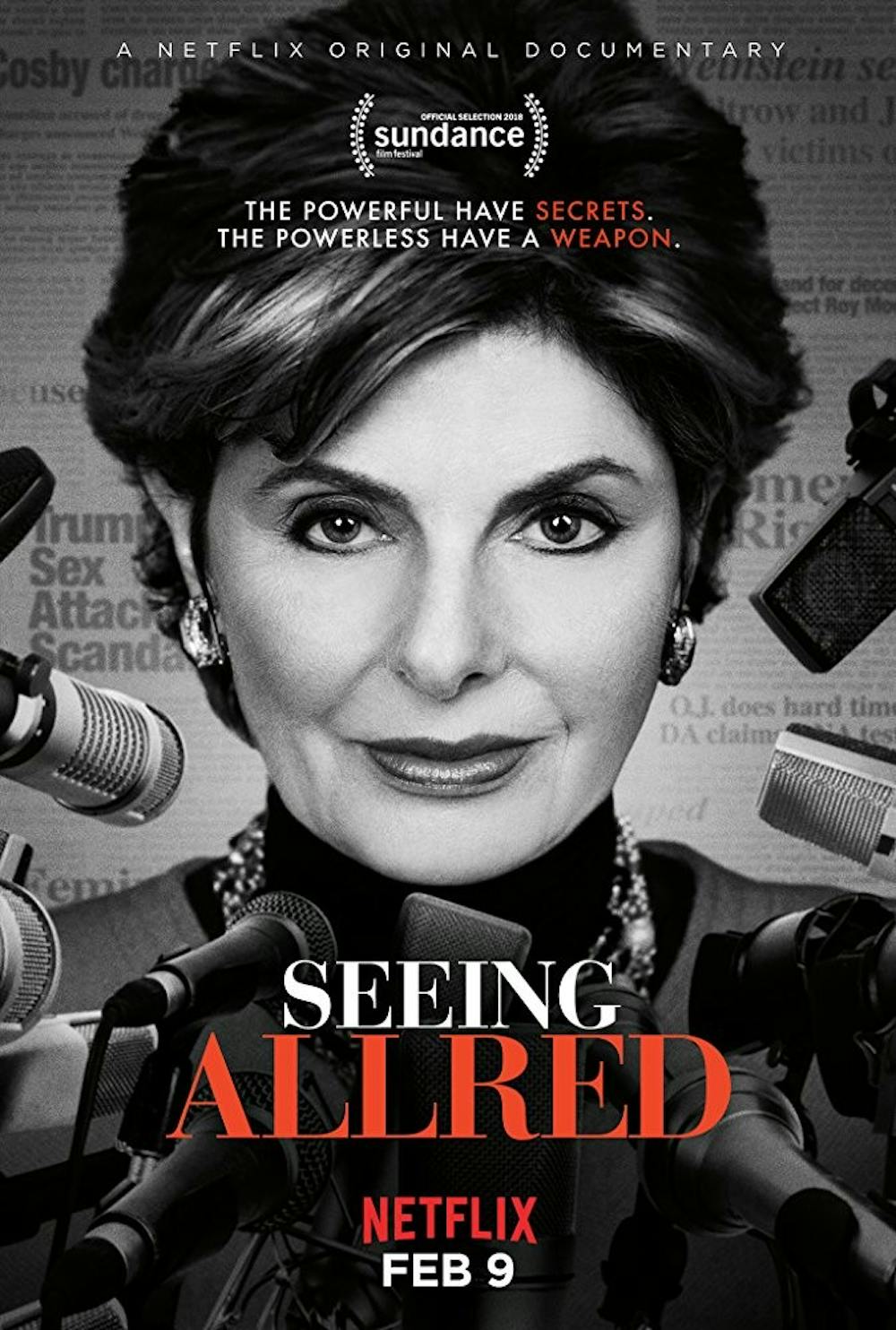“I think we have a uterus and a brain and they both work.” A young Gloria Allred made this statement on the talk show “Dinah!” in the year 1977, leaving the host and live audience speechless. This clip serves as the opening scene for the new Netflix documentary “Seeing Allred,” and for good reason. The image of an outspoken Allred standing confidently amid a sea of sexism-sympathizers and status quo acceptors is a powerful one, setting the tone for the film and symbolizing her career as a champion for equal rights.
Directors Roberta Grossman and Sophie Sartain start “Seeing Allred” with a whirlwind montage, spanning the controversy surrounding the revolutionary attorney. Newspaper clippings of the cases she’s represented swirl around the screen, from the O.J. Simpson murder trial to the recent allegations made against disgraced former Senate candidate Roy Moore. The montage is accompanied by a soundtrack comprised of people calling Allred desperate for attention, telling her to shut up or making fun of her aggressive nature, quoting dialogue from the Gloria Allred character spoofs put forth by shows like “The Simpsons.” Allred’s thoughts on the distaste she leaves in the mouths of her critics? “I don’t really care,” she says in the seconds-long interview before the title fades.
The documentary starts in 2014, at the height of one of the most infamous cases regarding accusations of sexual assault against a celebrity in modern history — the Bill Cosby case. Allred brings dozens of women into the conference rooms at her offices in Los Angeles, Calif., hosting numerous press conferences and sitting with the women as each and every one reads her testimony.
In Allred, the victims of Bill Cosby found more than sympathy. They found an advocate and, even more than that, an advocate with the influence to catapult their stories into the worldwide media circuit. Allred allows these women — dozens of whom have lost their chance to have their day in court due to the statute of limitations on rape — to testify against Cosby in the court of public opinion. Simultaneously, she harshly criticizes the existence of a statute of limitations for the crime of rape.
This is the true power of Gloria Allred. She is not just a lawyer, not just an activist. She is truly a transformational force committed to aiding women in their evolution from victims — victims of discrimination, domestic violence or sexual assault — to survivors and then finally, to advocates themselves.
In the documentary, Allred says that her commitment to women comes for her own experiences. She describes falling in love during her first year at the University of Pennsylvania, getting married and then pregnant at the young age of 19. After a few years, the marriage was rocked by her husband being diagnosed with bipolar disorder. From there, he grew increasingly unstable and increasingly violent towards Allred. She took her daughter and left the abusive marriage, later finding out that her husband eventually took his own life.
Allred also describes her personal connection with sexual violence, relating how while on vacation in her 20s, she was assaulted at gunpoint by a doctor she’d met on the beach. Later, Allred found she was pregnant by her attacker, and she immediately sought to abort — before Roe v. Wade. The underground abortion almost killed Allred. While recovering from a hemorrhage in the hospital, she remembers a nurse coming up to her and saying, “This will teach you a lesson.”
Allred’s intimate knowledge not only of violence against women but of the lack of support for women in society fueled her passion for justice. She got her start in advocacy while employed as an inner-city high school teacher by becoming a union organizer. Then, she went to law school and started a firm with her Loyola Law School classmates Michael Maroko and Nathan Goldberg.
Eventually, Allred became involved with the National Organization for Women, and this is where her media personality rooted itself. After successfully and publically lobbying California Jerry Brown to keep his promise of appointing more female judges, Allred became a household name in the news circuit.
Allred’s public image truly lies at the core of the documentary and of her career. She used her newfound fame to her advantage, taking on cases that pulled out latent societal sexism. She sued a grocery store that separated boys’ and girls’ toys, sued a department store for charging women more for alterations than men and sued a restaurant for only telling men the prices of the food. She represented the family of the late Nicole Brown Simpson as O.J. Simpson was on trial for her murder. Allred took on cases that examined the many heads of sexism. She didn’t wait for cases to come to her — she went and found them. And the media followed her.
Gloria Allred uses her fame as a tool to cast a spotlight on the issues plaguing American society. “Seeing Allred” turns the spotlight temporarily back on her, and rightly so. The documentary highlights Allred’s endurance and dedication to equality, an expository yet complimentary look into the feminist icon that stands out as a positive take on one of history’s most powerful and controversial women.
Gloria Allred symbolizes strength, fearlessness and dedication — and she is nowhere near done. Her final line in the documentary, spoken while she is staring out of her office window at an America wrapped up in the Trump administration and the #MeToo movement, crystallizes that sentiment.
“The fight has just begun.”





